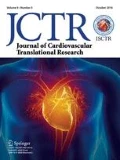Abstract
Over the last decades, tremendous advances have been made in understanding the genomic basis of a large number of chronic human diseases. Such advances were made possible by studying large numbers of patients over relatively long periods of time. It is increasingly recognized that acute robust stress stimulates pathways activated in chronic disease, facilitating mechanistic studies in much shorter time frames. A new field of molecular medicine, called perioperative genomics, uses robust surgical stress as a perturbation designed to explore such mechanisms. This new field is described briefly below.
Similar content being viewed by others
References
Mangano, D. T. (2004). Perioperative medicine: NHLBI working group deliberations and recommendations. Journal of Cardiothoracic and Vascular Anesthesia, 18(1), 1–6.
Kozak, L. J., Owings, M. F., & Hall, M. J. (2005). National Hospital Discharge Survey: 2002 annual summary with detailed diagnosis and procedure data. Vital and Health Statistics, 13(158), 1–199.
McFalls, E. O., et al. (2004). Coronary-artery revascularization before elective major vascular surgery. New England Journal of Medicine, 351(27), 2795–2804.
Feezor, R. J., et al. (2004). Genomic and proteomic determinants of outcome in patients undergoing thoracoabdominal aortic aneurysm repair. Journal of Immunology, 172(11), 7103–7109.
Mathew, J. P., et al. (2007). Genetic variants in P-selectin and C-reactive protein influence susceptibility to cognitive decline after cardiac surgery. Journal of the American College of Cardiology, 49(19), 1934–1942.
Stafford-Smith, M., et al. (2005). Association of genetic polymorphisms with risk of renal injury after coronary bypass graft surgery. American Journal of Kidney Diseases, 45(3), 519–530.
Welsby, I. J., et al. (2005). Genetic factors contribute to bleeding after cardiac surgery. Journal of Thrombosis and Haemostasis, 3(6), 1206–1212.
Podgoreanu, M. V., et al. (2006). Inflammatory gene polymorphisms and risk of postoperative myocardial infarction after cardiac surgery. Circulation, 114(1 Suppl), I275–1281.
Grocott, H. P., et al. (2005). Genetic polymorphisms and the risk of stroke after cardiac surgery. Stroke, 36(9), 1854–1858.
Author information
Authors and Affiliations
Corresponding author
Rights and permissions
About this article
Cite this article
Turer, A.T., Schwinn, D.A. Understanding the Transition to Acute Illness: The Promise of Perioperative Genomics. J. of Cardiovasc. Trans. Res. 1, 171–173 (2008). https://doi.org/10.1007/s12265-008-9018-0
Received:
Accepted:
Published:
Issue Date:
DOI: https://doi.org/10.1007/s12265-008-9018-0




